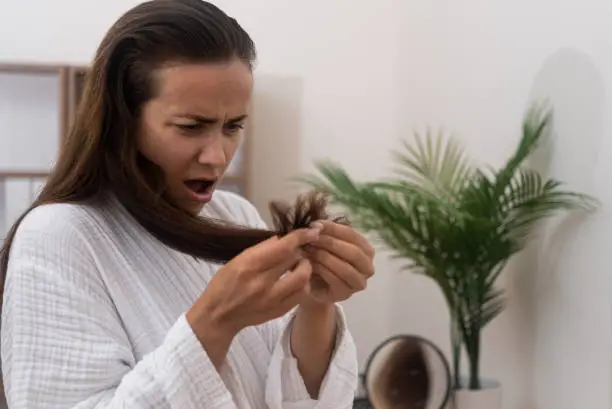Preventing hair loss caused by antidepressants can be a distressing side effect of taking antidepressant medications. While these medications can be essential for managing mental health conditions, dealing with hair loss can add an extra layer of stress.
However, there are simple steps you can take to help preventing hair loss caused by antidepressants. In this article, we will explore the causes of hair loss related to antidepressants and provide easy-to-follow tips to keep your locks healthy.
Understanding Preventing Hair Loss Caused by Antidepressants
Before we delve into prevention strategies, it’s essential to understand why some people experience hair loss while taking antidepressants. Hair loss associated with these medications typically occurs due to the following reasons:
- Telogen Effluvium: Antidepressants can disrupt the natural hair growth cycle. Normally, hair goes through a growth phase, a resting phase, and a shedding phase. Antidepressants can push more hair into the shedding phase prematurely, leading to increased hair loss.
- Stress: Dealing with depression or anxiety is stressful on its own, and stress is a known trigger for hair loss. Combining the stress of your mental health condition with the potential side effects of antidepressants can exacerbate hair loss.
Now, let’s explore some simple ways to prevent or reduce hair loss caused by antidepressants.

♻️ You May Also Like: Understanding For Suddenly Shoulder Pain Without Injury 2023?
Nutritious Diet
Eating a healthy diet is crucial for helping healthy hair. Focus on including foods rich in essential nutrients like:
- Protein: Hair is primarily made of protein, so make sure to include lean meats, fish, eggs, and beans in your diet.
- Vitamins: Vitamins such as Biotin (Vitamin B7), Vitamin D, and Vitamin E are essential for hair health. You can find these in foods like nuts, seeds, leafy greens, and fortified cereals.
- Iron: Iron deficiency can contribute to hair loss. Include iron-rich foods like spinach, red meat, and lentils in your meals.
- Omega-3 Fatty Acids: These healthy fats found in fish, flaxseeds, and walnuts can help nourish your hair follicles.
Hair Care Routine
Gentle care of your hair can go a long way in preventing further hair loss:
- Use a natural ingredient shampoo and conditioner affodable for your hair type.
- Be gentle when brushing your hair to prevent breakage.
- Consider using a wide-toothed comb to detangle wet hair, which is more fragile.
Stress Management
Managing stress is crucial for both your mental health and your hair. Simple stress-reduction techniques include:
- Practice relaxation exercises for deep breathing or treatment.
- Engage in ever-day physical activity, such as walking or yoga and exercise.
- Get enough sleep to allow your body to recover from stress.
Consult Your Healthcare Provider
If you notice significant hair loss while taking antidepressants, don’t hesitate to talk to your healthcare provider. They can assess your condition and may recommend:
- Adjusting your medication dosage or switching to a different antidepressant with fewer hair-related side effects.
- Prescribing hair growth treatments like Minoxidil.
- Referring you to a dermatologist who specializes in hair loss.
Hair Supplements
In some cases, your doctor might suggest hair supplements to support hair growth. These supplements can include:
- Biotin supplements, which promote hair and nail health.
- Multivitamins tailored to hair health, containing vitamins and minerals like biotin, zinc, and folic acid.
Conclusion Of Preventing Hair Loss Caused by Antidepressants
Experiencing hair loss while taking antidepressants can be challenging, but with a few simple lifestyle changes, you can minimize its impact on your hair and overall well-being. Remember to maintain a balanced diet, adopt a gentle hair care routine, manage stress, consult your healthcare provider, and consider hair supplements if recommended. By taking these steps, you can help prevent or reduce hair loss and focus on your journey toward better mental health.
Frequently Asked Questions
Hair loss can be a worrying side effect of taking antidepressants. Although the connection between hair loss and antidepressants is not entirely clear, it is a common problem for many people. To help you better understand and resolve this issue, here are some frequently asked questions (FAQs) about preventing antidepressant-induced hair loss:
- Why do some antidepressants cause hair loss?
The exact mechanism by which some antidepressants cause hair loss is not well understood.
- Which antidepressants are commonly associated with hair loss?
Not all antidepressants cause hair loss and the risk may vary from person to person.
- Can I switch to another antidepressant to prevent hair loss?
That changing medication should always be discussed with your doctor. Changing medications can be challenging and is not a guarantee of reduction in hair loss.
- Are there certain antidepressants that are less likely to cause hair loss?
Some antidepressants, such as bupropion (Wellbutrin), are thought to reduce the risk of hair loss.